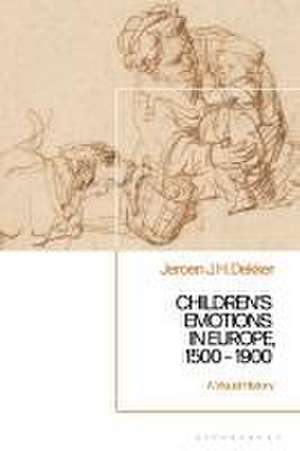Children’s Emotions in Europe, 1500 – 1900: A Visual History
Autor Professor Jeroen J. H. Dekkeren Limba Engleză Hardback – mai 2024
Preț: 513.04 lei
Preț vechi: 596.56 lei
-14% Nou
Puncte Express: 770
Preț estimativ în valută:
98.18€ • 101.43$ • 81.71£
98.18€ • 101.43$ • 81.71£
Carte tipărită la comandă
Livrare economică 25 martie-08 aprilie
Preluare comenzi: 021 569.72.76
Specificații
ISBN-13: 9781350150706
ISBN-10: 1350150703
Pagini: 320
Ilustrații: 65 bw illus
Dimensiuni: 156 x 234 x 27 mm
Greutate: 0.65 kg
Editura: Bloomsbury Publishing
Colecția Bloomsbury Academic
Locul publicării:London, United Kingdom
ISBN-10: 1350150703
Pagini: 320
Ilustrații: 65 bw illus
Dimensiuni: 156 x 234 x 27 mm
Greutate: 0.65 kg
Editura: Bloomsbury Publishing
Colecția Bloomsbury Academic
Locul publicării:London, United Kingdom
Caracteristici
Unique examination of children's emotions and how these were regulated in educational settings in Europe
Notă biografică
Jeroen J. H. Dekker is Honorary Professor of History and Philosophy of Education at the University of Groningen, The Netherlands. He is the author of several books in English, French and Dutch, including Educational Ambitions in History (2010) and The Will to Change the Child: Re-Education Homes for Children at Risk in Nineteenth Century Western Europe (2001). He is also the editor of several volumes, such as A Cultural History of Education in the Renaissance (Bloomsbury, forthcoming). Professor Dekker is a former President of ISCHE, Editor of Paedagogica Historica, and a former Visiting Professor at the EUI, Italy, Columbia University, USA and the Max Planck Institute for Human Development, Germany.
Cuprins
List of FiguresAcknowledgements1: The Making of a Visual History of Children's Emotions in EuropePart I: Belief in the Child as Animal Educandum: Children's Emotions in the Age of Renaissance and Reformation2: The Big Talk on Education and Emotions in the Age of Renaissance and Reformation3: The Expression of Children's Emotions in the Age of Renaissance and Reformation4: The Birth of a Mission: Educating Emotional Literacy in the Age of Renaissance and Reformation Part II: Between Child and Education: Children's Emotions in the Age of Enlightenment, Romanticism, and Science 5: The Big Talk on Education and Emotions in the Age of Enlightenment, Romanticism, and Science6: The Expression of Children's Emotions in the Age of Enlightenment, Romanticism, and Science7: Training Children in Emotional Literacy in the Age of Enlightenment, Romanticism, and Science8: Conclusion: changing discourses, continuing emotions NotesBibliographyIndex
